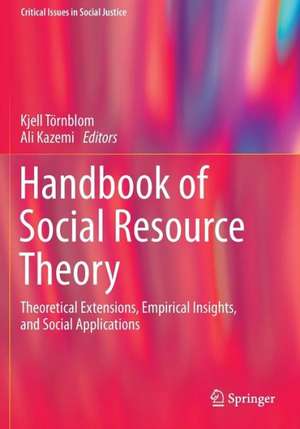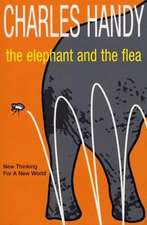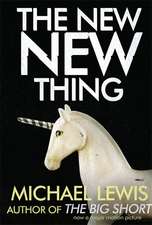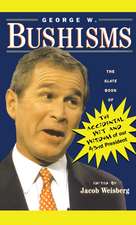Handbook of Social Resource Theory: Theoretical Extensions, Empirical Insights, and Social Applications: Critical Issues in Social Justice
Editat de Kjell Törnblom, Ali Kazemien Limba Engleză Paperback – 15 iul 2014
Over the past four decades, Social Resource Theory (SRT) has evolved to build vital links between social psychology and public policy, providing a valuable lens for understanding and addressing social class, inequality, and injustice. The recent conceptual and theoretical developments and future prospects of this robust field are on full display in this Handbook of Social Resource Theory. An international, interdisciplinary panel of experts expands on the pioneering work of the late Dr. Uriel Foa and his wife Edna Foa, starting with the basic structure of SRT. The Handbook includes integrations of SRT with other social scientific frameworks, analyses of organizational and cultural issues, reports of empirical research using various methods, as well as applications to different areas including:
- Social justice
- Quality of life
- Interpersonal relationships
- Social dilemmas
- Stress management
- Work satisfaction
- Cognitive development
- Consumer behavior
- Cross-cultural behavior
“The Handbook presents the basic tenets of the social resource theory originated from the late Uriel Foa and provides an authoritative agenda for the future developments of this theory. Kjell Törnblom and Ali Kazemi have made an excellent job in gathering a global group of contributingscholars representing an outstanding mix of respected and long-standing researchers in social psychology, sociology, psychology, management, economics and marketing, political science, history, and applied ethics/philosophy. This Handbook is an ideal resource for researchers, instructors, and graduate students in all these fields with an interest in social resource theory.”
Edna B. Foa
Professor of Clinical Psychology, University of Pennsylvania
“Uriel Foa (1916-1990) developed social resource theory in the 1960s. In the next half century this theory has generated an enormous amount of new data and theory in social, cross-cultural, and educational psychology, as well as in related disciplines. It has inspired work on interpersonal relationships, attributions, the understanding of status, morality, distributive justice, procedural justice, social dilemmas, interpersonal evaluation, biosocial theory, and action construal. Applications in both organizational and educational settings and in marketing studies indicate the theory’s relevance for the “real world.” This volume edited by Kjell Törnblom and Ali Kazemi is the wonderful Festschrift that Foa did not have, because he died when he was too young by contemporary life expectancy standards. It includes chapters by many of the stars of the fields that social resource theory has influenced.”
Harry C. Triandis
Professor Emeritus, University of Illinois
“Forty years ago Edna and Uriel Foa began to spell out the unwritten social rules by which we trade – on a daily basis – friendship, information, respect, gifts, favors and other rewards and punishments. Sociologists, psychologists, economists, and others owe the editors a tremendous debt of gratitude for reminding us of the eloquence and indispensability of the originalwork on social resource theory and for bringing together a distinguished roster of scholars and scientists to reflect on the theory and to exercise it in the service of addressing an astonishing number and variety of important social and organizational problems.”
John T. Jost
Professor of Psychology and Politics, New York University
“What material and symbolic goods count as resources? How do resources relate to power? How can the exchange and distribution of resources be understood in both interpersonal and societal terms? In this outstanding volume, Törnblom and Kazemi bring together a constellation of experts from a variety of disciplines to address questions such as these. Taking as their basis the classic statement by Uriel and Edna Foa of the resource theory of social exchange, the Handbook moves through theoretical to practical analyses and presents both laboratory and field research conducted in a number of different countries. The book makes an excellent contribution to our understanding of social exchange theory in particular and of social relationships in general. The collection is both impressive and important.”
Faye J Crosby
Professor of Psychology, University of California Santa Cruz
“A tour de force, this comprehensive volume presents cutting edge insights inspired by Foa and Foa’s social resource theory. Törnblom and Kazemi have brought together a stellar cast to address ageless questions about the cornerstones of social life and provide generative roadmaps for future theorizing and research. This volume is a rich resource for scholars as well as students and educated readers who want to know more about the complexities of social life.”
Linda J. Skitka
Professor of Psychology, University of Illinois atChicago
| Toate formatele și edițiile | Preț | Express |
|---|---|---|
| Paperback (1) | 712.36 lei 6-8 săpt. | |
| Springer – 15 iul 2014 | 712.36 lei 6-8 săpt. | |
| Hardback (1) | 967.08 lei 6-8 săpt. | |
| Springer – 6 noi 2012 | 967.08 lei 6-8 săpt. |
Din seria Critical Issues in Social Justice
- 15%
 Preț: 643.34 lei
Preț: 643.34 lei - 15%
 Preț: 646.75 lei
Preț: 646.75 lei - 18%
 Preț: 1233.52 lei
Preț: 1233.52 lei - 18%
 Preț: 978.12 lei
Preț: 978.12 lei - 15%
 Preț: 643.00 lei
Preț: 643.00 lei - 5%
 Preț: 1101.37 lei
Preț: 1101.37 lei - 15%
 Preț: 645.79 lei
Preț: 645.79 lei - 18%
 Preț: 1108.63 lei
Preț: 1108.63 lei - 15%
 Preț: 646.75 lei
Preț: 646.75 lei - 15%
 Preț: 649.87 lei
Preț: 649.87 lei - 15%
 Preț: 646.62 lei
Preț: 646.62 lei - 18%
 Preț: 952.09 lei
Preț: 952.09 lei - 15%
 Preț: 647.08 lei
Preț: 647.08 lei - 18%
 Preț: 1376.98 lei
Preț: 1376.98 lei - 18%
 Preț: 952.72 lei
Preț: 952.72 lei -
 Preț: 386.81 lei
Preț: 386.81 lei -
 Preț: 387.58 lei
Preț: 387.58 lei -
 Preț: 386.81 lei
Preț: 386.81 lei - 15%
 Preț: 654.77 lei
Preț: 654.77 lei - 15%
 Preț: 651.51 lei
Preț: 651.51 lei - 18%
 Preț: 953.03 lei
Preț: 953.03 lei -
 Preț: 392.21 lei
Preț: 392.21 lei -
 Preț: 383.71 lei
Preț: 383.71 lei
Preț: 712.36 lei
Preț vechi: 838.08 lei
-15% Nou
Puncte Express: 1069
Preț estimativ în valută:
136.31€ • 142.32$ • 112.81£
136.31€ • 142.32$ • 112.81£
Carte tipărită la comandă
Livrare economică 05-19 aprilie
Preluare comenzi: 021 569.72.76
Specificații
ISBN-13: 9781493913527
ISBN-10: 1493913522
Pagini: 492
Ilustrații: XXII, 470 p. 27 illus.
Dimensiuni: 178 x 254 x 26 mm
Greutate: 0.85 kg
Ediția:2012
Editura: Springer
Colecția Springer
Seria Critical Issues in Social Justice
Locul publicării:New York, NY, United States
ISBN-10: 1493913522
Pagini: 492
Ilustrații: XXII, 470 p. 27 illus.
Dimensiuni: 178 x 254 x 26 mm
Greutate: 0.85 kg
Ediția:2012
Editura: Springer
Colecția Springer
Seria Critical Issues in Social Justice
Locul publicării:New York, NY, United States
Public țintă
GraduateCuprins
1 Introduction. Social Resource Theory: Yesterday, Today, and Tomorrow.- Part I The Basic Framework.- 2 Resource Theory of Social Exchange.- 3 Some Conceptual and Theoretical Issues in Resource Theory of Social Exchange.- Part II Conceptual and Theoretical Developments.- 4 Toward an Expansion of Resource Exchange Theory: A Facet Approach.- 5 Formalizing Foa’s Social Resource Theory of Exchange.- 6 Social Exchange Theory, Exchange Resources, and Interpersonal Relationships: A Modest Resolution of Theoretical Difficulties.- 7 Attribution of Friendship: The Influence of the Nature and Comparability of Resources Given and Received.- 8 Understanding Status as a Social Resource.- 9 Moral Resources.- 10 The Structural Bases of Resource Distribution.- Part III Theoretical Integrations.- 11 Towards Integrating Distributive Justice, Procedural Justice, and Social Resource Theories.- 12 Resource Types and Fairness Perceptions in Social Dilemmas.- 13 Goods, Bads, and the Foa Resources: Analyzing Their Operation in the New Unified Theory of Sociobehavioral Forces.- 14 The Complementary Natures of Resource Theory and Interpersonal Evaluation Theory.- 15 A Biosocial Approach to Resource Theory.- Part IV Organizational, Institutional, Societal, and Inter-cultural Issues.- 16 The Emergence of Social Meaning: A Theory of Action Construal.- 17 Some Hypotheses on Cross-Cultural Differences in the Impact of Resource Type on the Preferred Principle of Distributive Justice.- 18 Cultural Differences in Resource Exchange at the Workplace: A Sino-US Comparison.- 19 The Positive, Sustaining, and Protective Power of Resources: Insights from Conservation of Resources Theory.- 20 Initiating Customer Loyalty to a Retailer: A Resource Theory Perspective.- 21 Resources and Transactions in the Organization’s Underworld: Exchange Content and Consequences.- Part V Justice Conceptions and Processes in Resource Exchange.- 22 Limitations on Structural Principles of Distributive Justice: TheCase of Discrete Idiosyncratic Goods.- 23 Predicting Reactions to Procedural Injustice via Insights from Resource Theory.- 24 Resource Theory and Restoration: What is Restored in Restorative Justice?.- 25 The Salience of Outcome and Procedure in Giving and Receiving Universalistic and Particularistic Resources.- 26 Evaluating the Distribution of Various Resources in Educational Settings: The Views of Jewish and Arab Teachers in Israel.- 27 Factorial Survey Methods for Studying Goods, Bads, and the Foa Resources.- Part VI Envoi 28 Where Do We Stand and Where Do We Need to Go?.
Recenzii
The Handbook presents the basic tenets of the social resource theory originated from the late Uriel Foa and provides an authoritative agenda for the future developments of this theory. Kjell Törnblom and Ali Kazemi have made an excellent job in gathering a global group of contributing scholars representing an outstanding mix of respected and long-standing researchers in social psychology, sociology, psychology, management, economics and marketing, political science, history, and applied ethics/philosophy. This Handbook is an ideal resource for researchers, instructors, and graduate students in all these fields with an interest in social resource theory.”
Edna B. Foa
Professor of Clinical Psychology, University of Pennsylvania
“Uriel Foa (1916-1990) developed social resource theory in the 1960s. In the next half century this theory has generated an enormous amount of new data and theory in social, cross-cultural, and educational psychology, as well as in related disciplines. It has inspired work on interpersonal relationships, attributions, the understanding of status, morality, distributive justice, procedural justice, social dilemmas, interpersonal evaluation, biosocial theory, and action construal. Applications in both organizational and educational settings and in marketing studies indicate the theory’s relevance for the “real world.” This volume edited by Kjell Törnblom and Ali Kazemi is the wonderful Festschrift that Foa did not have, because he died when he was too young by contemporary life expectancy standards. It includes chapters by many of the stars of the fields that social resource theory has influenced.”
Harry C. Triandis
Professor Emeritus, University of Illinois
“Forty years ago Edna and Uriel Foa began to spell out the unwritten social rules by which we trade – on a daily basis – friendship, information, respect, gifts, favors and other rewardsand punishments. Sociologists, psychologists, economists, and others owe the editors a tremendous debt of gratitude for reminding us of the eloquence and indispensability of the original work on social resource theory and for bringing together a distinguished roster of scholars and scientists to reflect on the theory and to exercise it in the service of addressing an astonishing number and variety of important social and organizational problems.”
John T. Jost
Professor of Psychology and Politics, New York University
“What material and symbolic goods count as resources? How do resources relate to power? How can the exchange and distribution of resources be understood in both interpersonal and societal terms? In this outstanding volume, Törnblom and Kazemi bring together a constellation of experts from a variety of disciplines to address questions such as these. Taking as their basis the classic statement by Uriel and Edna Foa of the resource theory of social exchange, the Handbook moves through theoretical to practical analyses and presents both laboratory and field research conducted in a number of different countries. The book makes an excellent contribution to our understanding of social exchange theory in particular and of social relationships in general. The collection is both impressive and important.”
Faye J Crosby
Professor of Psychology, University of California Santa Cruz
“A tour de force, this comprehensive volume presents cutting edge insights inspired by Foa and Foa’s social resource theory. Törnblom and Kazemi have brought together a stellar cast to address ageless questions about the cornerstones of social life and provide generative roadmaps for future theorizing and research. This volume is a rich resource for scholars as well as students and educated readers who want to know more about the complexities of social life.”
Linda J.Skitka
Professor of Psychology, University of Illinois at Chicago
Edna B. Foa
Professor of Clinical Psychology, University of Pennsylvania
“Uriel Foa (1916-1990) developed social resource theory in the 1960s. In the next half century this theory has generated an enormous amount of new data and theory in social, cross-cultural, and educational psychology, as well as in related disciplines. It has inspired work on interpersonal relationships, attributions, the understanding of status, morality, distributive justice, procedural justice, social dilemmas, interpersonal evaluation, biosocial theory, and action construal. Applications in both organizational and educational settings and in marketing studies indicate the theory’s relevance for the “real world.” This volume edited by Kjell Törnblom and Ali Kazemi is the wonderful Festschrift that Foa did not have, because he died when he was too young by contemporary life expectancy standards. It includes chapters by many of the stars of the fields that social resource theory has influenced.”
Harry C. Triandis
Professor Emeritus, University of Illinois
“Forty years ago Edna and Uriel Foa began to spell out the unwritten social rules by which we trade – on a daily basis – friendship, information, respect, gifts, favors and other rewardsand punishments. Sociologists, psychologists, economists, and others owe the editors a tremendous debt of gratitude for reminding us of the eloquence and indispensability of the original work on social resource theory and for bringing together a distinguished roster of scholars and scientists to reflect on the theory and to exercise it in the service of addressing an astonishing number and variety of important social and organizational problems.”
John T. Jost
Professor of Psychology and Politics, New York University
“What material and symbolic goods count as resources? How do resources relate to power? How can the exchange and distribution of resources be understood in both interpersonal and societal terms? In this outstanding volume, Törnblom and Kazemi bring together a constellation of experts from a variety of disciplines to address questions such as these. Taking as their basis the classic statement by Uriel and Edna Foa of the resource theory of social exchange, the Handbook moves through theoretical to practical analyses and presents both laboratory and field research conducted in a number of different countries. The book makes an excellent contribution to our understanding of social exchange theory in particular and of social relationships in general. The collection is both impressive and important.”
Faye J Crosby
Professor of Psychology, University of California Santa Cruz
“A tour de force, this comprehensive volume presents cutting edge insights inspired by Foa and Foa’s social resource theory. Törnblom and Kazemi have brought together a stellar cast to address ageless questions about the cornerstones of social life and provide generative roadmaps for future theorizing and research. This volume is a rich resource for scholars as well as students and educated readers who want to know more about the complexities of social life.”
Linda J.Skitka
Professor of Psychology, University of Illinois at Chicago
Notă biografică
Ali Kazemi received his Ph.D. in Psychology from Gothenburg University and is Associate Professor of Social Psychology and Dean for the Faculty Board of Education, Health and Social Sciences at University of Skövde in Sweden. His dissertation on fairness in social dilemmas received the ‘Best 2007 Dissertation Award’. He has been the incumbent of several academic positions at the Universities of Skövde, Gothenburg, and Jönköping, as well as at the Swedish National Road and Transport Research Institute. He has conducted and published basic and applied research within the areas of social justice, well-being, decision making in social dilemmas, and attitude and behavior change. Kazemi has authored/co-edited four books, serves on the editorial board of the International Journal of Conflict and Reconciliation, and is the Editor-in-Chief with Törnblom for Social Justice Research.
Kjell Törnblom received his Ph.D. from the University of Missouri-Columbia where Uriel Foa was one of his teachers at the doctoral program in social psychology. They have since collaborated on several publications. Törnblom has co-edited three books (e.g., Distributive and Procedural Justice: Research and Social Applications, with Riël Vermunt) and a number of theme issues of Social Justice Research for which he and Ali Kazemi are now Editors-in-Chief. Törnblom’s research on social justice, resource theory, conflict, intergroup relations, and theory integration has been published in various professional journals and as book chapters. He has held positions at universities in the US, Sweden and Canada, is now a Professor Emeritus and also affiliated as a guest researcher with ETH (Swiss Federal Institute of Technology Zurich).
Kjell Törnblom received his Ph.D. from the University of Missouri-Columbia where Uriel Foa was one of his teachers at the doctoral program in social psychology. They have since collaborated on several publications. Törnblom has co-edited three books (e.g., Distributive and Procedural Justice: Research and Social Applications, with Riël Vermunt) and a number of theme issues of Social Justice Research for which he and Ali Kazemi are now Editors-in-Chief. Törnblom’s research on social justice, resource theory, conflict, intergroup relations, and theory integration has been published in various professional journals and as book chapters. He has held positions at universities in the US, Sweden and Canada, is now a Professor Emeritus and also affiliated as a guest researcher with ETH (Swiss Federal Institute of Technology Zurich).
Textul de pe ultima copertă
Our lives as human beings are characterized by production and use of social resources, material (e.g., money and physical possessions) as well as immaterial (such as love, knowledge, and power). Distribution and exchange of these resources are central to individuals’ physical and mental health and quality of life.
Over the past four decades, Social Resource Theory (SRT) has evolved to build vital links between social psychology and public policy, providing a valuable lens for understanding and addressing social class, inequality, and injustice. The recent conceptual and theoretical developments and future prospects of this robust field are on full display in this Handbook of Social Resource Theory. An international, interdisciplinary panel of experts expands on the pioneering work of the late Dr. Uriel Foa and his wife Edna Foa, starting with the basic structure of SRT. The handbook includes integrations of SRT with other social scientific frameworks, analyses of organizational and cultural issues, reports of empirical research using various methods, as well as applications to different areas including:
The Handbook presents the basic tenets of the social resource theory originated from the late Uriel Foa and provides an authoritative agenda for the future developments of this theory. Kjell Törnblom and Ali Kazemihave made an excellent job in gathering a global group of contributing scholars representing an outstanding mix of respected and long-standing researchers in social psychology, sociology, psychology, management, economics and marketing, political science, history, and applied ethics/philosophy. This Handbook is an ideal resource for researchers, instructors, and graduate students in all these fields with an interest in social resource theory.”
Edna B. Foa
Professor of Clinical Psychology, University of Pennsylvania
“Uriel Foa (1916-1990) developed social resource theory in the 1960s. In the next half century this theory has generated an enormous amount of new data and theory in social, cross-cultural, and educational psychology, as well as in related disciplines. It has inspired work on interpersonal relationships, attributions, the understanding of status, morality, distributive justice, procedural justice, social dilemmas, interpersonal evaluation, biosocial theory, and action construal. Applications in both organizational and educational settings and in marketing studies indicate the theory’s relevance for the “real world.” This volume edited by Kjell Törnblom and Ali Kazemi is the wonderful Festschrift that Foa did not have, because he died when he was too young by contemporary life expectancy standards. It includes chapters by many of the stars of the fields that social resource theory has influenced.”
Harry C. Triandis
Professor Emeritus, University of Illinois
“Forty years ago Edna and Uriel Foa began to spell out the unwritten social rules by which we trade – on a daily basis – friendship, information, respect, gifts, favors and other rewards and punishments. Sociologists, psychologists, economists, and others owe the editors a tremendous debt of gratitude for reminding us of the eloquence and indispensability of the original work on social resource theory and for bringing together a distinguished roster of scholars and scientists to reflect on the theory and to exercise it in the service of addressing an astonishing number and variety of important social and organizational problems.”
John T. Jost
Professor of Psychology and Politics, New York University
“What material and symbolic goods count as resources? How do resources relate to power? How can the exchange and distribution of resources be understood in both interpersonal and societal terms? In this outstanding volume, Törnblom and Kazemi bring together a constellation of experts from a variety of disciplines to address questions such as these. Taking as their basis the classic statement by Uriel and Edna Foa of the resource theory of social exchange, the Handbook moves through theoretical to practical analyses and presents both laboratory and field research conducted in a number of different countries. The book makes an excellent contribution to our understanding ofsocial exchange theory in particular and of social relationships in general. The collection is both impressive and important.”
Faye J Crosby
Professor of Psychology, University of California Santa Cruz
“A tour de force, this comprehensive volume presents cutting edge insights inspired by Foa and Foa’s social resource theory. Törnblom and Kazemi have brought together a stellar cast to address ageless questions about the cornerstones of social life and provide generative roadmaps for future theorizing and research. This volume is a rich resource for scholars as well as students and educated readers who want to know more about the complexities of social life.”
Linda J. Skitka
Professor of Psychology, University of Illinois at Chicago
Over the past four decades, Social Resource Theory (SRT) has evolved to build vital links between social psychology and public policy, providing a valuable lens for understanding and addressing social class, inequality, and injustice. The recent conceptual and theoretical developments and future prospects of this robust field are on full display in this Handbook of Social Resource Theory. An international, interdisciplinary panel of experts expands on the pioneering work of the late Dr. Uriel Foa and his wife Edna Foa, starting with the basic structure of SRT. The handbook includes integrations of SRT with other social scientific frameworks, analyses of organizational and cultural issues, reports of empirical research using various methods, as well as applications to different areas including:
- Social justice.
- Quality of life.
- Interpersonal relationships.
- Social dilemmas.
- Stress management.
- Work satisfaction.
- Cognitive development.
- Consumer behavior.
- Cross-cultural behavior.
The Handbook presents the basic tenets of the social resource theory originated from the late Uriel Foa and provides an authoritative agenda for the future developments of this theory. Kjell Törnblom and Ali Kazemihave made an excellent job in gathering a global group of contributing scholars representing an outstanding mix of respected and long-standing researchers in social psychology, sociology, psychology, management, economics and marketing, political science, history, and applied ethics/philosophy. This Handbook is an ideal resource for researchers, instructors, and graduate students in all these fields with an interest in social resource theory.”
Edna B. Foa
Professor of Clinical Psychology, University of Pennsylvania
“Uriel Foa (1916-1990) developed social resource theory in the 1960s. In the next half century this theory has generated an enormous amount of new data and theory in social, cross-cultural, and educational psychology, as well as in related disciplines. It has inspired work on interpersonal relationships, attributions, the understanding of status, morality, distributive justice, procedural justice, social dilemmas, interpersonal evaluation, biosocial theory, and action construal. Applications in both organizational and educational settings and in marketing studies indicate the theory’s relevance for the “real world.” This volume edited by Kjell Törnblom and Ali Kazemi is the wonderful Festschrift that Foa did not have, because he died when he was too young by contemporary life expectancy standards. It includes chapters by many of the stars of the fields that social resource theory has influenced.”
Harry C. Triandis
Professor Emeritus, University of Illinois
“Forty years ago Edna and Uriel Foa began to spell out the unwritten social rules by which we trade – on a daily basis – friendship, information, respect, gifts, favors and other rewards and punishments. Sociologists, psychologists, economists, and others owe the editors a tremendous debt of gratitude for reminding us of the eloquence and indispensability of the original work on social resource theory and for bringing together a distinguished roster of scholars and scientists to reflect on the theory and to exercise it in the service of addressing an astonishing number and variety of important social and organizational problems.”
John T. Jost
Professor of Psychology and Politics, New York University
“What material and symbolic goods count as resources? How do resources relate to power? How can the exchange and distribution of resources be understood in both interpersonal and societal terms? In this outstanding volume, Törnblom and Kazemi bring together a constellation of experts from a variety of disciplines to address questions such as these. Taking as their basis the classic statement by Uriel and Edna Foa of the resource theory of social exchange, the Handbook moves through theoretical to practical analyses and presents both laboratory and field research conducted in a number of different countries. The book makes an excellent contribution to our understanding ofsocial exchange theory in particular and of social relationships in general. The collection is both impressive and important.”
Faye J Crosby
Professor of Psychology, University of California Santa Cruz
“A tour de force, this comprehensive volume presents cutting edge insights inspired by Foa and Foa’s social resource theory. Törnblom and Kazemi have brought together a stellar cast to address ageless questions about the cornerstones of social life and provide generative roadmaps for future theorizing and research. This volume is a rich resource for scholars as well as students and educated readers who want to know more about the complexities of social life.”
Linda J. Skitka
Professor of Psychology, University of Illinois at Chicago
Caracteristici
Provides new methodologies and context for Social Resource Theory Provides a comprehensive and detailed explanation of Social Resource Theory, including a chapter by Uriel Foa, the founder of the theory Expands on the previous limits of Social Resource Theory, providing new applications Includes supplementary material: sn.pub/extras Includes supplementary material: sn.pub/extras














